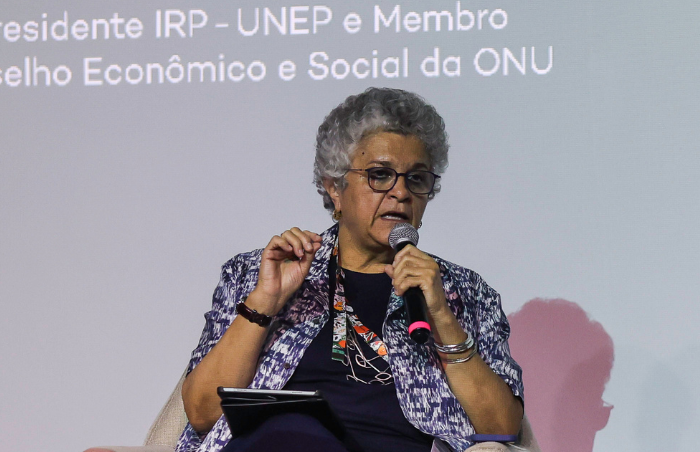By Fabrício Queiroz, revised and edited by Daniel Nardin. Photos by Filipe Bispo
Earlier this month, during the Amazon and New Economies Conference held in Belém, former Environment Minister Izabella Teixeira highlighted in an interview with Amazônia Vox how climate denialism hinders the implementation of public policies to address climate change. On Tuesday (19), the Brazilian government, the United Nations (UN) and UNESCO launched the Global Initiative for Climate Change Information Integrity as an action strategy to strengthen research and measures that can combat misinformation that contributes to delaying and making climate action unfeasible.
See the article on the UN website about the initiative here
Currently co-chair of the International Resource Panel (IRP), a United Nations Environment Programme (UNEP) dedicated to producing knowledge on critical issues related to natural resources and achieving the Sustainable Development Goals (SDGs), Izabella highlighted the points that must be observed for actions to combat disinformation, including calling on those responsible for big tech companies, the companies that control search and social media platforms.
“Denialism involves misinformation. Big Tech is heavily involved, just as in the case of vaccines,” she says, recalling the impact that fake news had on the fight against the Covid-19 pandemic. Regarding climate change, Izabella highlights that reality has already demonstrated in everyday life what was predicted by scientific knowledge.
“What was expected to happen at the end of the century is starting to happen now. As the temperature rises by more than 1.5ºC, we will be increasingly exposed. If people don't want to be convinced by science and argument, nature is coming to show that it is changing and this will be increasingly frequent in a certain magnitude”, points out Izabela.
For her, tackling the issue involves an exercise of freedom, but one that must consider responsibility in the handling of information. “It is a choice. Brazil, as we are a democratic country, is a choice for Brazilians. Get information from those who tell the truth and not from those who want to benefit from false information. When you are dealing with people’s lives, living conditions, and protecting people, you should not play around with this,” she warns.
Contrary to this perspective, what currently prevails is a conception of freedom that represents, according to Izabella, a “privilege of living in ignorance”. The impact of this is the increase in risks linked to extreme events that tend to amplify crises involving so-called climate refugees, as well as the political intensification driven by the climate agenda. “If people don't want to use scientific arguments because they live in the privilege of ignorance, it is the privilege of part of the population that wants to be ignorant; There is another side that nature will show and it is showing with the droughts happening, with losses. The cost of not acting is much greater than the cost of acting politically. And nature not only takes revenge on us… we can try to kill it, but it will kill us first”, he argues.
Although Brazil reflects articulations and conflicts that also occur throughout the world, Izabella Teixeira sees that the country has the means to face the climate emergency with a proactive and leadership strategy, considering both the solutions developed here for the sustainable development agenda and the opportunities it has to direct the efforts of the main nations from the presidency of the G20, the BRICs in 2025 and the COP30 in Belém next year.
“With these conferences, this whole international movement happening in Brazil this year and next year, I think it is a great opportunity to better understand the demands of society, know how to communicate better, mobilize better, listen more and not adopt the path of ignorance and exclusion”, he reflects.




